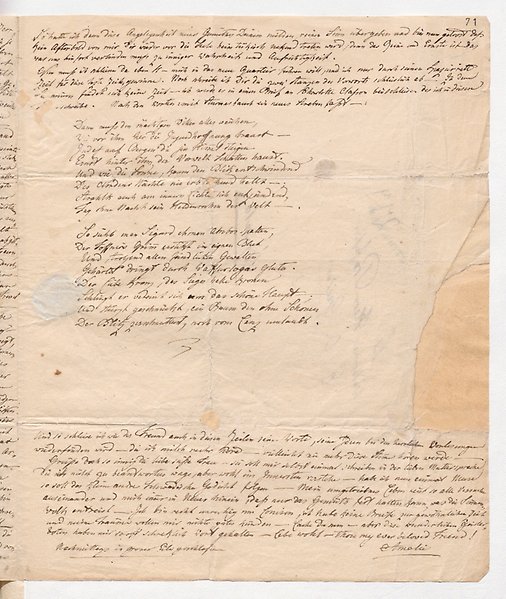Interactions
Gender, Nation and Authorship in the Work of Amalie von Helvig
Details
- Funder: Internal funding
This project is closed
Project Description
This dissertation explores the interactions between concepts of gender, nation and authorship in the work of the German writer Amalie von Helvig, née Imhoff (1776–1831). With her biography shaped by mobility, and political and cultural changes, Helvig is particularly suitable for examining the importance of gender and nationality as well as network contacts for the work and influence of women writers around 1800. Questions of nationality were especially actualised in relation to Helvig’s two visits to Sweden (1806–1810 and 1814–1816). Acting as a "cultural transmitter" (Petra Broomans) between Germany and Sweden, Helvig contributed actively to the processes of nation building. As a writer in different genres, literary agent and patron, reviewer and translator of Swedish authors, Helvig not only conveyed her image of the "North" to her German readership, but also played a major role in shaping the way her Swedish acquaintances perceived Germany.
The study investigates a selection of works from Helvig’s entire creative period in close readings, taking into account letters and written testimonies of contemporary reception. The concepts of gender and nation serve as theoretical and thematic starting points, as they have turned out to be highly relevant for the investigation of Helvig’s work and influence. Intertextuality, imagology and network analysis are used as methods to make interactions between norms and practical actions visible. The study analyses how Helvig related to the fundamental paradox between discursive notions of femininity and authorship on the one hand and her own profession as a writer on the other. Furthermore, it looks at how gender and nation as aspects of Helvig’s identity affected the creation, publication and reception of her works and perceptions of Helvig as a writer. What notions of "German" and "Nordic" are conveyed in Helvig’s work, and how she shaped notions of the national characteristics of Sweden and Germany through her work as a cultural transmitter, is a third issue investigated in this dissertation.
It is the conclusion of the study that the interactions of gender, nation and authorship were complex in their consequences. Helvig being a woman, mother and artist; a German living in Sweden; and a born aristocrat married to a bourgeois military officer, situated in fluctuating social, cultural and geographical milieus with their own aesthetic norms and ideals, has considerably shaped her work and its reception. However, Helvig and her works have not only been shaped by those intersections. As demonstrated by the close readings presented in this dissertation, she also used the tension between the expectations in her different roles to shed light on their norms, to question or confirm them, and even to subtly amend them.

Selection of a letter written by Amalie von Helvig to Erik Gustaf Geijer, Berlin, October 27th, 1816 (Uppsala University Library Carolina Rediviva, sign. Geijer G 85 j, 71). The page includes two stanzas from Helvig's poetic foreword to the second volume of Taschenbuch der Sagen und Legenden, alluding to characters in Old Norse mythology.
About the Project
Project Duration
2018–2023
Funding
Uppsala University
Researcher
- Jules Kielmann (PhD candidate)

